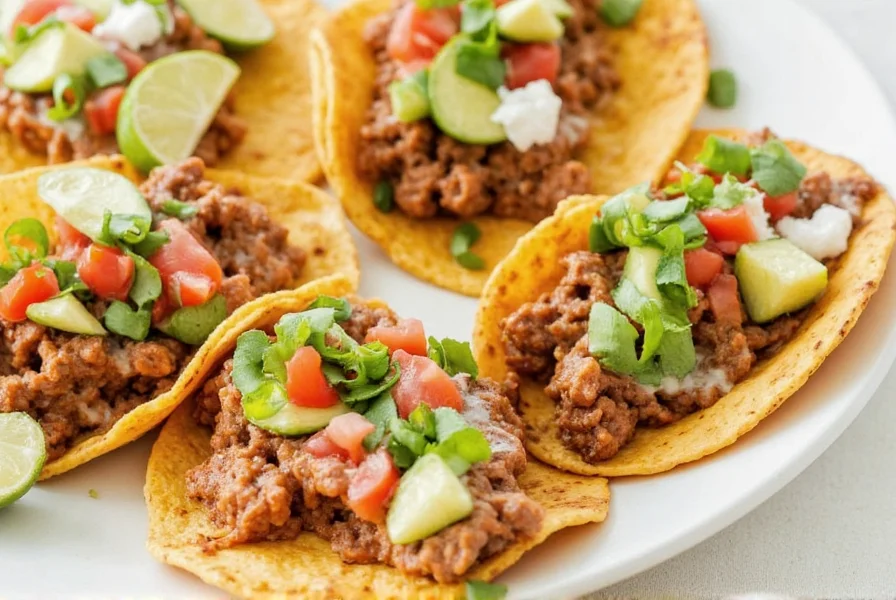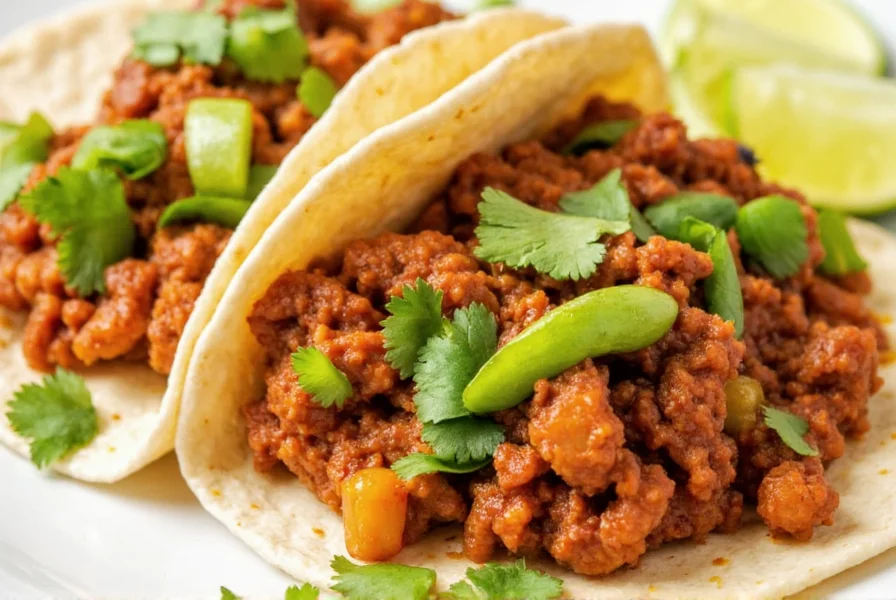Learn how to make authentic Al Pastor Tacos at home with this step-by-step guide. This traditional Mexican dish features marinated pork cooked with chilies, pineapple, and spices, served in warm corn tortillas with fresh toppings. Below you'll find all the ingredients, marinade recipe, cooking methods, and assembly tips you need for perfect results.

Essential Ingredients for Authentic Al Pastor
Al pastor is all about balance — sour, sweet, spicy, and savory. Here's what you'll need:
- Pork shoulder (or pork butt)
- Guajillo chilies
- Ancho chilies
- Dried pasilla chilies
- Vinegar
- Orange juice (or pineapple juice)
- Garlic
- Onion
- Cumin
- Oregano (preferably Mexican oregano)
- Annatto (achiote paste or powder)
- Adobo seasoning (optional)
And let's not forget the crown jewel — a juicy slice of pineapple on top of the meat while it cooks. It adds sweetness and keeps everything moist.

The Al Pastor Marinade – A Spicy Symphony
The key to al pastor is the marinade, known as "adobo." Unlike American barbecue rubs or dry spice blends, this is a wet, vibrant, and deeply spiced mixture that infuses the pork over time.
Creating the Adobo Sauce
- Rinse and soak dried chilies in hot water for 20 minutes until softened.
- Blend soaked chilies with garlic, onion, vinegar, orange juice, cumin, oregano, annatto, and salt until smooth.
- Taste and adjust — if it's too bitter, add more vinegar or citrus; too mild? Add more chilies or spices.
| Chili Type | Flavor Profile | Heat Level (Scoville) |
|---|---|---|
| Guajillo | Berries, tea, and green bell pepper notes | 2,500–5,000 SHU |
| Ancho | Sweet, fruity, raisin-like flavors | 1,000–2,000 SHU |
| Pasilla | Grassy, earthy, with dark fruit tones | 1,000–2,500 SHU |
This trio forms the backbone of traditional al pastor. You can tweak proportions based on your taste preferences — but never skip annatto. It gives that gorgeous red-orange color and unique earthy warmth.
Choosing and Prepping the Meat
Traditionally, al pastor uses marinated pork shoulder, also called pork butt. It's fatty and flavorful — perfect for slow cooking.

Cutting and Marinating the Pork
- Cut pork into thin slices — about 1/4-inch thick — for faster absorption and even cooking.
- In a large bowl or zip-top bag, coat each piece thoroughly with adobo sauce.
- Refrigerate for at least 8 hours, ideally 24–48 hours for maximum flavor penetration.
Cooking Techniques – Vertical, Grilled, or Stove-Top?
In Mexico City, al pastor is cooked on a vertical spit called a trompo. At home, we adapt! Here's how to cook it using various methods:

Vertical Rotisserie Setup (if you have one):
- Layer thin slices of marinated pork around a vertical skewer.
- Add a pineapple on top — it caramelizes and bastes the meat below.
- Roast slowly, turning occasionally until the outer layer crisps up.
No Rotisserie? No Problem:
| Method | Pros | Cons |
|---|---|---|
| Grill (Skewered) | Smoky flavor, charred edges | Can dry out meat if not monitored |
| Stove-Top Skillet | Faster, easier cleanup | Less crispiness than grilling |
| Oven (Broiler) | Even cooking, good for large batches | Requires close attention to avoid burning |
Putting It All Together – Tacos, Onions, and Cilantro
Once the meat is done, thinly slice or shred it — don't forget those crispy bits! Now, assemble your tacos with style:
- Warm corn tortillas (never flour!)
- Thinly sliced white onions
- Fresh cilantro leaves
- Optional toppings: diced avocado, salsa verde, lime wedge

Don't overdo it — al pastor shines best when the flavors are balanced. Let the meat be the star.
Buying Guide: Must-Have Tools and Ingredients
Ready to shop? Here are some recommended items to elevate your al pastor game:
| Product | Description | Best For | Occasion |
|---|---|---|---|
| Mexican Oregano | Earthy, floral notes different from Mediterranean oregano | Authentic al pastor flavor | Weekend cooking, taco nights |
| Achiote Paste | Red-orange pigment with peppery, nutty undertones | Color and depth of flavor | Any Mexican dish needing warmth and vibrancy |
| Cast Iron Skillet | Retains heat well for searing meat | Stovetop al pastor prep | Quick weeknight meals |
| Rotisserie Attachment | For gas or charcoal grills | Simulating trompo-style cooking | Outdoor parties, weekend fun |
| Premium Corn Tortillas | Soft, pliable, and non-GMO | Holding up to juicy meat | Dinner parties, family gatherings |
Pro Tips for Elevating Your Al Pastor Tacos
Want to take your tacos from good to legendary? Here are some pro-level tricks:
- Marinate overnight – Flavor needs time to develop.
- Use pineapple juice instead of orange for a sweeter twist.
- Toast your spices before blending to unlock deeper aromatics.
- Save extra marinade and brush it onto the meat during cooking for extra juiciness.
- Add a touch of soy sauce to boost umami without overpowering other flavors.

Frequently Asked Questions
What cut of meat is best for authentic al pastor tacos?
Pork shoulder (also called pork butt) is the traditional and best cut for al pastor. Its ideal fat-to-meat ratio (about 30% fat) ensures juicy, flavorful results after slow cooking. The marbling melts during cooking, basting the meat from within and creating those signature crispy edges. While you can use other cuts like pork loin, they lack sufficient fat and often turn out dry.
How long should I marinate the pork for authentic al pastor?
For authentic results, marinate your pork for a minimum of 8 hours, but ideally 24-48 hours. The adobo marinade needs time to penetrate the meat and break down fibers through the acid (vinegar and citrus). During this time, the chilies' flavors fully develop and the annatto works its magic. Don't skip this step — rushing the marination results in surface-level flavor rather than the deep, complex taste that defines authentic al pastor.
Can I make al pastor without a trompo (vertical rotisserie)?
Absolutely! While the traditional trompo creates those perfect crispy edges as the meat rotates, you can achieve excellent results at home with alternative methods. The best home technique is using a cast iron skillet: cook thin slices over medium-high heat until crispy on the edges. Another great option is skewering the meat and grilling it, which gives you that desirable char. For oven cooking, use the broiler setting with meat arranged on a wire rack over a baking sheet to allow fat to drip away.
Why is pineapple used in al pastor tacos?
Pineapple serves multiple crucial purposes in authentic al pastor. First, the natural enzymes in pineapple (bromelain) help tenderize the meat. Second, as it cooks on top of the trompo, the caramelizing pineapple juice drips down, adding subtle sweetness that balances the chilies' heat. Third, the acidity cuts through the richness of the pork. Finally, it creates that distinctive sweet-savory flavor profile that defines authentic al pastor. Don't skip it — it's not just for garnish!
What's the difference between al pastor and carnitas?
While both are Mexican pork dishes, they're fundamentally different. Al pastor features marinated pork shoulder cooked with chilies, spices, and pineapple, resulting in a sweet, tangy, and slightly spicy flavor with characteristic red-orange color. Carnitas, meaning "little meats," is pork (usually shoulder) slow-cooked in its own fat until tender, then crisped — it has a pure pork flavor with crispy texture but no marinade or pineapple. Al pastor is always served in tacos with pineapple garnish, while carnitas are often served with salsa verde.
What are the essential spices that can't be skipped in authentic al pastor?
Three elements are non-negotiable for authentic al pastor flavor: 1) The chili trio (guajillo, ancho, and pasilla) that creates the complex flavor base 2) Annatto (achiote), which provides the signature color and earthy notes 3) Mexican oregano (not Mediterranean oregano), which has a more citrusy, floral profile essential to the authentic taste. While you can adjust chili quantities based on heat preference, eliminating any of these core components will result in a dish that misses the authentic al pastor character.
Conclusion
Al pastor tacos aren't just a meal — they're a celebration of culture, flavor, and community. With the right spice blend, quality meat, and a bit of patience, you can recreate this classic dish in your own kitchen. Whether you go full-on trompo or keep it simple on the stovetop, one bite will remind you why al pastor has stood the test of time.
So grab your apron, fire up the grill, and get ready to taco your way through one of the world's most delicious dishes. ¡Buen provecho!











 浙公网安备
33010002000092号
浙公网安备
33010002000092号 浙B2-20120091-4
浙B2-20120091-4